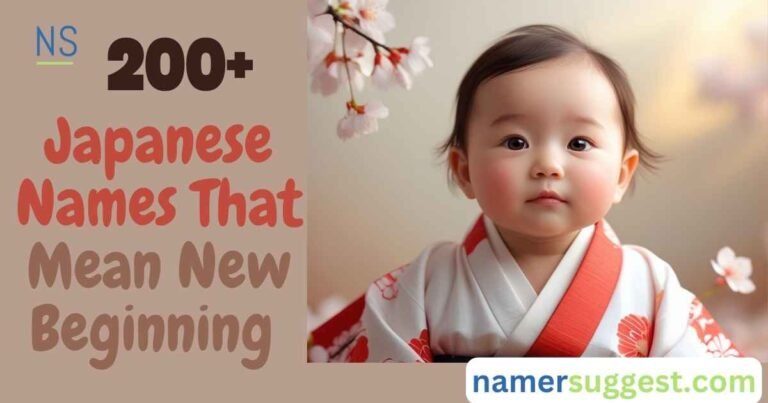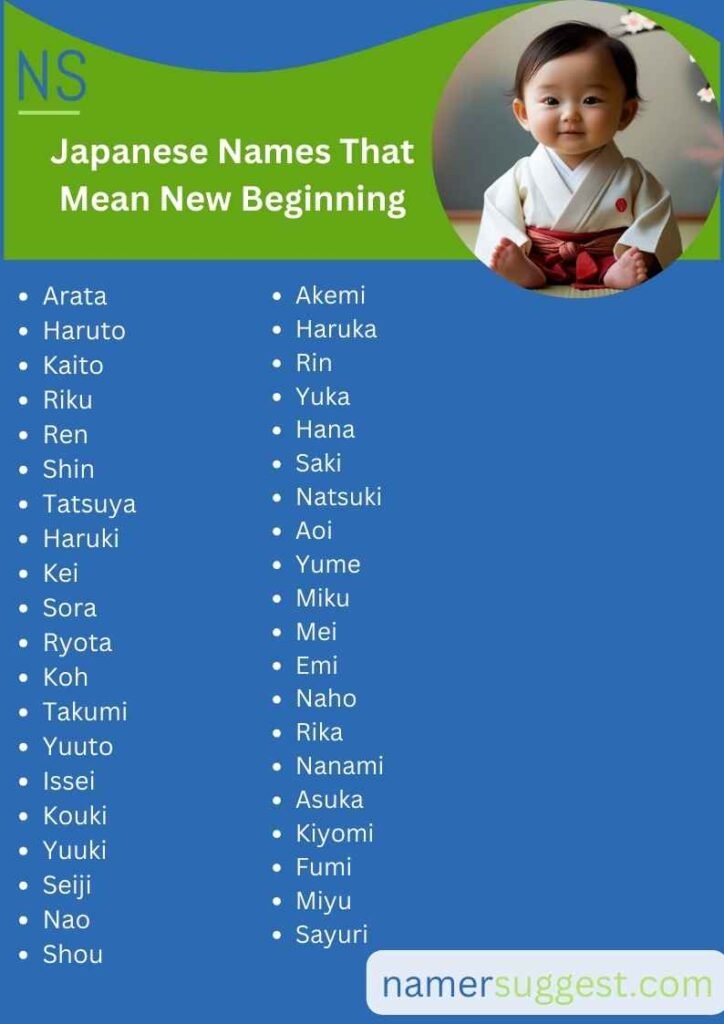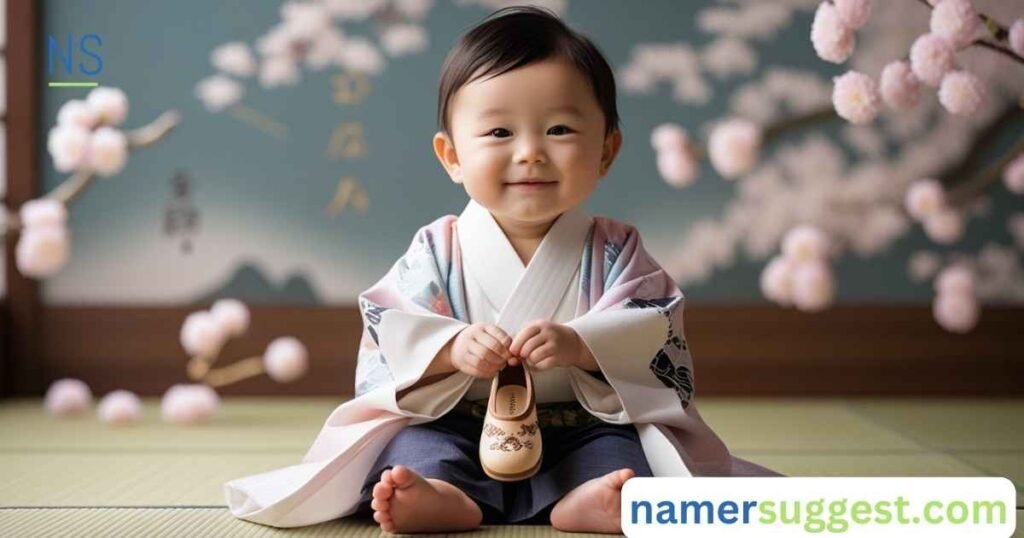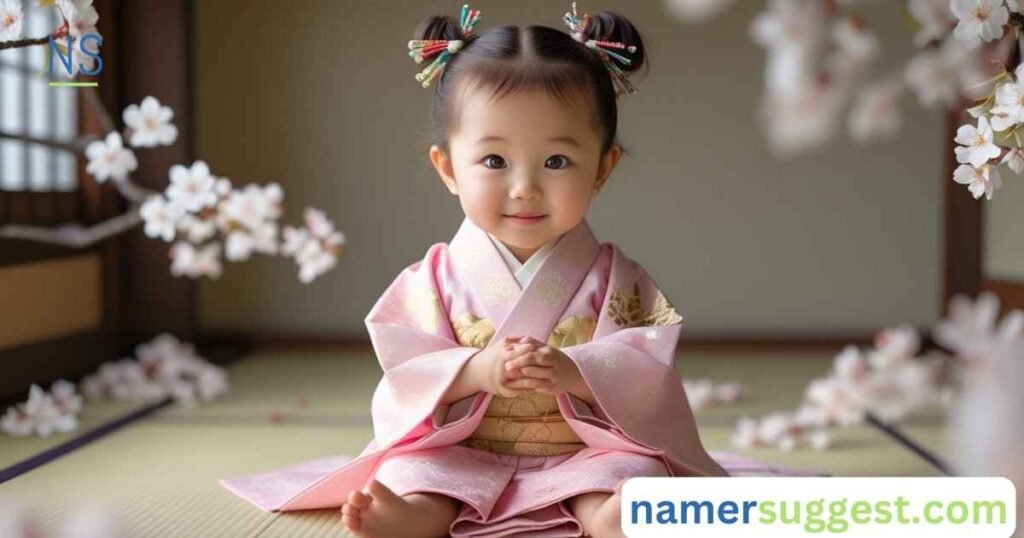
Choosing a name for your child is one of the most meaningful decisions a parent can make. In many cultures, names are seen as more than just labels—they often carry deep, symbolic meanings that can influence a person’s life and identity. In Japan, names are particularly important, often chosen for the beautiful meanings they carry. If you’re looking for Japanese names that mean new beginning, you’re in the right place.
In this comprehensive guide, we’ll explore a variety of Japanese names associated with new beginnings—whether you’re looking for a name that symbolizes hope, renewal, or transformation. We’ll go through male and female names, gender-neutral names, and some rare finds. Along the way, we’ll dive into the cultural significance of names in Japan, how kanji plays a role in shaping their meanings, and more.
Japanese Names That Mean New Beginning Generator
Our Japanese Names That Mean New Beginning Generator helps you discover unique and meaningful names that symbolize fresh starts and growth. With a variety of options, you can find the perfect name for your new chapter in life.

Top Picks: Japanese Names That Mean New Beginning

Before we dive into a list of names, let’s first highlight a few of the most beautiful and powerful names that represent a fresh start. These names stand out because they embody the essence of hope, growth, and transformation.
- Arata (新) – New, fresh start.
- Haruto (陽翔) – Sunlight, soaring.
- Kaito (海翔) – Ocean, soaring.
- Akemi (明美) – Bright, beautiful.
- Rin (凛) – Dignified, cold (symbolizing purity and new beginnings).
- Haruka (遥) – Far away, distant (new horizons).
- Sora (空) – Sky, heavens.
- Kai (海) – Ocean, sea.
- Nao (直) – Honest, straightforward.
- Yuki (雪) – Snow, symbolizing a fresh start.
These names represent different aspects of a new beginning: light, the promise of the future, and even nature’s cycles. Now, let’s explore more names in greater detail.
The Cultural Significance of Names in Japan
In Japan, names are not just a form of identification—they’re imbued with cultural meaning. A name often reflects the aspirations parents have for their child and carries the hopes of future success, happiness, and virtue. New beginnings, in particular, are a common theme in Japanese names. These names often incorporate kanji characters that evoke positive qualities such as renewal, hope, and growth.
Kanji, the characters used in Japanese writing, are often chosen because they have specific meanings. For example, the character “新” (Arata) means “new,” symbolizing a fresh start. Many Japanese names for new beginnings are drawn from nature, seasons, or virtues like brightness, purity, and hope.
Fun Fact: The Japanese New Year (Shōgatsu) is the most important holiday in Japan, symbolizing new beginnings. It’s no surprise that many names related to new beginnings carry a sense of optimism and renewal.
Male Japanese Names That Mean New Beginning

Male names in Japan often reflect strength, resilience, and hope—traits that are perfect for symbolizing a fresh start. Here’s a list of male names that signify new beginnings:
- Arata (新) – New, fresh start.
- Haruto (陽翔) – Sunlight, soaring.
- Kaito (海翔) – Ocean, soaring.
- Riku (陸) – Land, earth (symbolizing stability and foundation).
- Ren (蓮) – Lotus, symbolizing rebirth.
- Shin (真) – Truth, new.
- Tatsuya (達也) – Accomplished, progressing.
- Haruki (春樹) – Spring tree.
- Kei (啓) – Enlighten, inspire.
- Sora (空) – Sky, heavens.
- Ryota (涼太) – Refreshing, cool.
- Koh (光) – Light, shining.
- Takumi (匠) – Artisan, skilled.
- Yuuto (優翔) – Gentle, soaring.
- Issei (一生) – One life, new start.
- Kouki (光輝) – Radiant light.
- Yuuki (勇気) – Courage, bravery.
- Seiji (清司) – Pure, righteous.
- Nao (直) – Honest, straightforward.
- Shou (翔) – Soaring, flying.
These names represent various qualities that symbolize new beginnings—light, courage, purity, and the promise of a bright future. They’re perfect for a child who will grow into someone strong, virtuous, and hopeful.
Female Japanese Names That Mean New Beginning

Female names in Japan often evoke beauty, grace, and renewal—qualities that reflect a new chapter in life. Here’s a list of female names that mean new beginnings:
- Akemi (明美) – Bright, beautiful.
- Haruka (遥) – Distant, far-reaching.
- Rin (凛) – Dignified, pure.
- Yuka (優香) – Gentle, fragrant.
- Hana (花) – Flower, bloom.
- Saki (咲) – Bloom, blossom.
- Natsuki (夏希) – Summer hope.
- Aoi (葵) – Hollyhock, symbolizing the season of spring.
- Yume (夢) – Dream, hope.
- Miku (未来) – Future, potential.
- Mei (芽衣) – Sprout, new growth.
- Emi (恵美) – Blessed, beautiful.
- Naho (尚穂) – Everlasting, prosperity.
- Rika (理香) – Logic, fragrance.
- Nanami (七海) – Seven seas, vast horizons.
- Asuka (飛鳥) – Flying bird, freedom.
- Kiyomi (清美) – Pure beauty.
- Fumi (文) – Literature, culture.
- Miyu (美優) – Beautiful, gentle.
- Sayuri (小百合) – Small lily, symbolizing purity.
These names capture the spirit of new beginnings through their meanings, evoking images of flowers blooming, light shining, and distant dreams. They are perfect for a child who represents the hope and potential of the future.
Gender-Neutral Japanese Names That Mean New Beginning
Gender-neutral names are becoming increasingly popular, and many of these names symbolize new beginnings, offering flexibility for parents who want a name that works for both boys and girls. Here are 20 gender-neutral Japanese names that mean new beginnings:
- Sora (空) – Sky, heavens.
- Ren (蓮) – Lotus, symbolizing rebirth.
- Kai (海) – Ocean, sea.
- Haru (春) – Spring, new season.
- Yu (優) – Gentle, superiority.
- Kou (光) – Light, shining.
- Yuki (雪) – Snow, symbolizing a fresh start.
- Aki (秋) – Autumn, renewal.
- Riko (莉子) – Jasmine, child of new beginnings.
- Shun (駿) – Quick, talented.
- Naoki (直樹) – Honest tree, fresh growth.
- Tomo (智) – Wisdom, intellect.
- Akira (明) – Bright, clear.
- Mika (美香) – Beautiful fragrance.
- Haruya (春也) – Spring, new growth.
- Kiyo (清) – Pure, clean.
- Mizu (水) – Water, flow.
- Aoi (葵) – Hollyhock, symbolizing new life.
- Noa (乃愛) – Love, beautiful.
- Kii (希) – Hope, wish.
These names carry the essence of renewal and growth, perfect for a child who is a symbol of hope and new beginnings. Whether for a boy, girl, or non-binary child, these names represent a future full of possibility.
Uncommon Japanese Names with New Beginning Meanings
For those looking for something a little more unique and rare, here are some uncommon Japanese names that still carry the powerful meaning of a fresh start. These names aren’t as frequently heard, making them special choices for your child:
- Kin (新) – New, fresh.
- Takaya (高矢) – High arrow, aiming for new heights.
- Akeo (明男) – Bright man, fresh outlook.
- Hatsune (初音) – First sound, a new beginning.
- Reiko (玲子) – Lovely child, symbolizing new hope.
- Fumiko (文子) – Child of literature, bright future.
- Ichirou (一郎) – First son, beginning of greatness.
- Yujiro (雄次郎) – Brave man, next in line.
- Masaki (正樹) – Correct tree, steady growth.
- Yoshinobu (吉信) – Good faith, a fresh start.
- Atsushi (厚志) – Thick, strong will.
- Izumi (泉) – Fountain, source of life.
- Nobu (信) – Faith, belief.
- Hironori (宏典) – Wide, rule, a new start.
- Rei (礼) – Gratitude, thanks, symbolizing a new chapter.
- Shigeru (茂) – Luxuriant, fresh growth.
- Kazuo (一雄) – First son, man of promise.
- Fujio (富士男) – Mount Fuji man, symbol of stability and renewal.
- Keisuke (啓介) – Enlightening, aiding progress.
- Kenzou (健三) – Healthy, third son, symbolizing vitality.
These names represent a blend of strength, wisdom, and optimism, and can be an excellent choice for parents who want a unique name with deep meaning.
The Role of Kanji in Shaping the Meaning of Names
In Japanese, the kanji characters used in a name are what give it meaning. Each kanji is a symbol that represents an idea, concept, or virtue. When combined, these characters can create names with profound meanings. For instance, the character “新” (Arata) means new, while “光” (Kou) means light. Together, these characters represent new light, symbolizing a fresh start.
Pro Tip: When choosing a name, parents often consider the visual aesthetic of the kanji along with its meaning, as the shape and balance of the characters are also important.
Common Kanji for New Beginnings
- 新 (Arata) – New, fresh.
- 光 (Kou) – Light, shining.
- 生 (Ikiru) – Life, birth.
- 翔 (Shou) – Soaring, flying.
- 希望 (Kibou) – Hope, aspiration.
Each of these kanji characters can be used in names to convey the idea of a new beginning or growth, making them perfect for parents who want a name full of potential.
20 Japanese Names That Mean New Beginning
| Japanese Name (Kanji) | Meaning |
| Arata (新) | New, fresh start |
| Haruto (陽翔) | Sunlight, soaring |
| Kaito (海翔) | Ocean, soaring |
| Akemi (明美) | Bright, beautiful |
| Rin (凛) | Dignified, cold (symbolizing purity) |
| Hana (花) | Flower, bloom |
| Saki (咲) | Bloom, blossom |
| Natsuki (夏希) | Summer hope |
| Yume (夢) | Dream, hope |
| Yuki (雪) | Snow, fresh start |
| Riko (莉子) | Jasmine, child of new beginnings |
| Sora (空) | Sky, heavens |
| Haruka (遥) | Distant, far-reaching |
| Takumi (匠) | Artisan, skilled |
| Akira (明) | Bright, clear |
| Mika (美香) | Beautiful fragrance |
| Tatsuya (達也) | Accomplished, progressing |
| Haruki (春樹) | Spring tree |
| Keisuke (啓介) | Enlightening, aiding progress |
| Rei (礼) | Gratitude, symbolizing a new chapter |
Names Inspired by Nature and New Beginnings
Japanese names often take inspiration from nature, and many symbols of renewal and new life come from the natural world. Whether it’s the changing seasons, flowers blooming, or the ocean tides, nature plays a key role in symbolizing new beginnings. Here are 20 names inspired by nature:
- Aoi (葵) – Hollyhock, symbolizing spring.
- Kiri (桐) – Paulownia tree, symbolizing rebirth.
- Natsu (夏) – Summer, full of life.
- Ame (雨) – Rain, refreshing new start.
- Mizu (水) – Water, symbolizing fluidity.
- Yama (山) – Mountain, solid foundation.
- Kawa (川) – River, symbolizing flow and change.
- Umi (海) – Sea, vast and infinite.
- Fuyu (冬) – Winter, a season of renewal.
- Haru (春) – Spring, symbolizing new life.
- Riku (陸) – Land, earth.
- Mochi (餅) – Rice cake, symbolizing prosperity.
- Tsubaki (椿) – Camellia flower, symbol of purity.
- Ame (雨) – Rain, symbol of renewal.
- Suzu (鈴) – Bell, bringing clarity and peace.
- Hinata (日向) – Sunny place.
- Matsu (松) – Pine tree, symbolizing longevity and new beginnings.
- Shizuka (静) – Quiet, peaceful start.
- Isamu (勇) – Courage, strength.
- Ryou (涼) – Refreshing, coolness.
Seasonal Japanese Names That Represent New Beginnings
In Japan, the changing seasons are seen as a powerful metaphor for new beginnings. The shift from one season to another represents cycles of renewal, growth, and transformation. Spring, in particular, is the season most associated with new life and fresh starts. Many Japanese names are inspired by these seasonal transitions, carrying with them meanings of hope, growth, and rebirth.
- Haruki (春樹) – Spring tree, symbolizing growth.
- Aki (秋) – Autumn, renewal.
- Natsuki (夏希) – Summer hope, optimism.
- Haru (春) – Spring, new season.
- Fuyu (冬) – Winter, a season of renewal.
- Kiyomi (清美) – Pure beauty (associated with fresh spring).
- Kouki (光輝) – Radiant light, as seen in spring.
- Satsuki (皐月) – May (the month of renewal).
- Mizuki (瑞希) – Beautiful moon, symbolizing clarity.
- Ame (雨) – Rain, representing new life in spring.
- Sayuri (小百合) – Small lily, symbolizing new beginnings.
- Kaho (香穂) – Fragrant ear of rice, symbolizing abundance in autumn.
- Shizuka (静) – Calm, tranquility (often associated with winter’s peacefulness).
- Asuka (飛鳥) – Flying bird, symbolizing freedom (perfect for new starts).
- Kazune (和音) – Harmonious sound, associated with autumn winds.
- Yuka (優香) – Gentle fragrance, representing a spring breeze.
- Seika (清花) – Pure flower, blooming anew.
- Rika (理香) – Logical fragrance, symbolizing thoughtful new beginnings.
- Koharu (小春) – Small spring, signifying the early days of the season.
- Haruka (遥) – Distant, far-reaching, symbolizing a journey ahead.
Seasonal names can hold deep symbolic meaning for a new life, especially if your child is born during a particular time of year. A spring-born child might be named Haruki, while a child born in autumn could carry the name Aki, each representing their season’s inherent promise of renewal and growth.
Modern Japanese Names That Symbolize a New Beginning
In contemporary Japan, many parents are opting for modern names that still carry traditional meanings but are fresh and innovative. These names often combine new ideas with old traditions, representing the evolution of culture and the promise of a new beginning.
Here’s a list of modern Japanese names that symbolize new beginnings:
- Aika (愛花) – Love, flower, symbolizing a blooming future.
- Takumi (匠) – Artisan, skillful, symbolizing new craftsmanship.
- Yuki (勇気) – Courage, bravery, a new start.
- Miu (美羽) – Beautiful feather, representing a light start.
- Maya (真弥) – True, to continue.
- Rio (莉央) – Jasmine, center of the world.
- Hina (陽菜) – Sunlight, greens, symbolizing new growth.
- Riku (陸) – Land, solid foundation for a fresh journey.
- Saki (咲) – Blooming, flowering.
- Lina (理奈) – Reason, beautiful.
- Kaito (海斗) – Ocean, Big Dipper.
- Yuto (悠翔) – Eternal, soaring.
- Akari (明莉) – Light, jasmine.
- Yuuto (優翔) – Gentle, flying high.
- Nina (仁奈) – Benevolence, elegance.
- Haruto (陽翔) – Sunlight, soaring high.
- Sora (空) – Sky, symbolizing vast potential.
- Nana (菜々) – Greens, prosperity.
- Hinata (日向) – Sunny place, symbolizing brightness.
- Kou (光) – Light, illumination.
These names represent modern takes on tradition—combining beauty, strength, and optimism with a fresh twist. Whether you’re looking for a name that suggests courage, freedom, or simply the promise of a bright future, these names can be perfect choices for any child who symbolizes new beginnings.
Famous Japanese People with Names Meaning New Beginnings
Names are often tied to the destinies of those who bear them. In Japan, many famous figures have names that carry the meaning of a new beginning or symbolizing hope, growth, or transformation. These individuals have made significant contributions to culture, sports, and politics, embodying the ideals of their names.
Here are a few famous Japanese people whose names symbolize new beginnings:
- Haruki Murakami – Renowned author. The name “Haruki” means spring tree, symbolizing new growth.
- Haruto Kiyomizu – A talented Japanese swimmer. His name means sunlight soaring, representing a bright future.
- Riku Hoshino – Famous young actor. “Riku” means land, symbolizing a firm foundation.
- Yuki Nagasato – A celebrated football player. Her name means snow, symbolizing new beginnings and purity.
- Kaito Ishikawa – Popular Japanese actor. His name Kaito means ocean, soaring, a powerful symbol of limitless potential.
- Miyuki Shirogane – Fictional character from Kaguya-sama: Love is War. “Miyuki” means beautiful happiness, representing fresh joy.
- Haruka Fukuhara – Famous voice actress. “Haruka” means far-reaching, symbolizing future success.
- Tatsuya Fujiwara – Famous actor. “Tatsuya” symbolizes accomplishment and progress, embodying constant new beginnings.
- Miku Nakano – Character from The Quintessential Quintuplets. “Miku” means future—perfect for a new journey ahead.
- Rina Sawayama – Popular singer. “Rina” symbolizes a new journey with clarity.
These famous individuals serve as real-life symbols of their names, achieving greatness in their respective fields. Their names reflect new beginnings in the sense of constant growth and the promise of new opportunities.
FAQs
What is the Japanese name for a new beginning?
The Japanese name for a new beginning is Arata (新). It means new or fresh.
What are Japanese names for rebirth?
Japanese names for rebirth include Ikiru (生), which means life, and Fuyuki (冬樹), symbolizing winter’s renewal.
What does Hiro mean?
Hiro (広) means wide, vast, or generous in Japanese. It can also imply expansion or growth.
What does Mizuki mean in Japanese?
Mizuki (瑞希) means beautiful moon or auspicious hope in Japanese. It symbolizes beauty and good fortune.
What are some popular Japanese names for girls?
Some popular Japanese names for girls are Hana (花), meaning flower, and Yuki (雪), meaning snow.
What is a symbolic name for new beginnings in Japanese?
A symbolic name for new beginnings is Haruto (陽翔), which combines sunlight and soaring to symbolize a fresh start.
Can Japanese names change with the seasons?
Yes, Japanese names like Haruki (春樹), meaning spring tree, reflect seasonal changes and the concept of renewal.
Conclusion
Choosing a name for a child is a profound decision. In Japanese culture, names hold deep meanings, often reflecting the values and hopes parents have for their child. Whether you’re looking for names that symbolize hope, growth, or renewal, Japanese names offer a rich variety of choices. From the delicate Haruka, meaning “far-reaching” to the bold Kaito, symbolizing “soaring over the ocean,” these names can be powerful reminders of new beginnings.
As we’ve explored, Japanese names carry with them centuries of tradition, blending beauty, nature, and the promise of the future. Whether you choose a common name or a rare one, a Japanese name for your child can be a perfect reflection of the new journey ahead.
Names like Arata, Sora, and Yuuto offer not just an identity but a future full of possibilities. Whatever name you choose, make sure it holds the meaning you desire and reflects the dreams you hope to nurture in your child’s life.






Leave a Reply